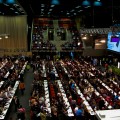Hot outside, icy on the inside: Day 2 at COP17
Tim Hall | November 30, 2011.
The ominous feeling at COP17 continued on the second day, as the World Meteorological Organization (WMO) released a preliminary report finding 2011 was the tenth hottest year on record.
Thirteen of the hottest years on record have now occurred in the last fifteen years.
The lower temperatures than 2010 though are not a sign of cooling, with the warming masked by strong La Nina conditions, which has a cooling influence. Summer ice melt also saw sea ice decline to smallest volume on record, reaffirming the extreme warming. It was a point WMO secretary-general Michel Jarraud stressed, “It proves unequivocally that the world is warming and that this warming is due to human activities,”
Negotiations on the second day partially heard his warnings. A pattern looking more and more like a coincidental coalition of Kyoto killers became more evident as countries begin engaging proper negotiations. The EU reaffirmed its position on a global legally binding treaty to be operational by 2020, and an eight year second commitment period to Kyoto—effectively meaning eight years of low ambition targets on emission reductions.
Canada continued being a de facto leader of the Kyoto killers, opposing a second commitment period of Kyoto and refusing to confirm or deny allegations they plan to formally withdraw from Kyoto. The split between countries sharing Canada’s concern that curbing emissions could damage economic competitiveness and those that insist curbs necessary could potentially derail post Kyoto negotiations as Durban.
The Alliance of small island states (AOSIS) insisted that any further delays on action would be unconscionable, promising, “We will not allow pressure from certain countries to seal the fate of the world for hundreds of years to come.”
To overcome these differences, the Africa Group put forward proposals consisting of compromises to seal some loopholes and overcome some sticking points on the negotiations. They made the promise that they would not let African soil be the graveyard for the Kyoto Protocol, a clear statement showing the importance of the African COP to developing nations.
This point was reiterated by the South African Environmental affairs minister, Edna Molewa, who called upon developed nations to show more leadership, saying the current levels of ambition won’t be enough to secure the future of the planet.
Finally, Qatar was named the host the next round of climate negotiations, COP18/MOP8 in 2012, with South Korea to hold a ministerial conference in the lead up. While Qatar has become increasingly influential globally, being nicknamed the exclamation mark of the middle east, it’s has the highest per-capita emissions in the world, with an average 55 tonnes per person. Maybe a COP will clean them up over the next twelve months?











comment